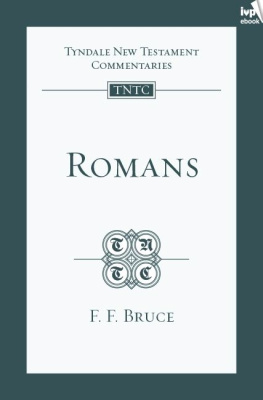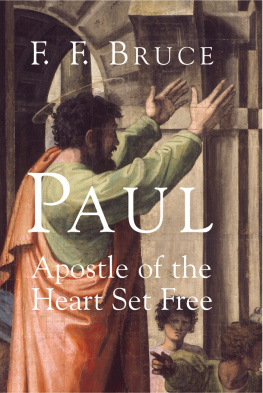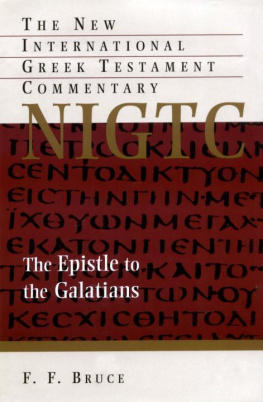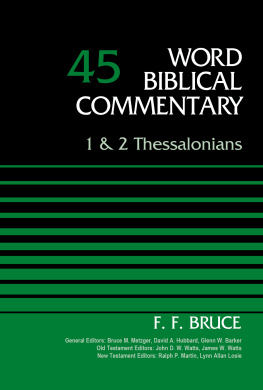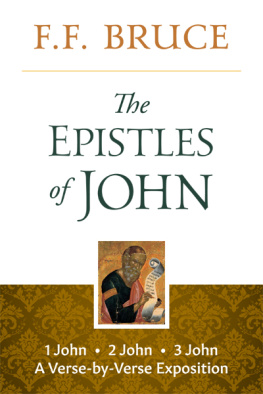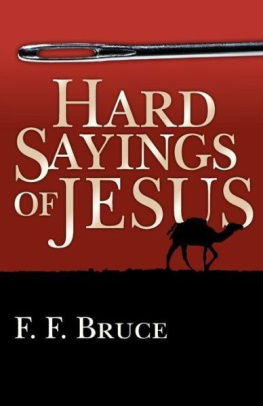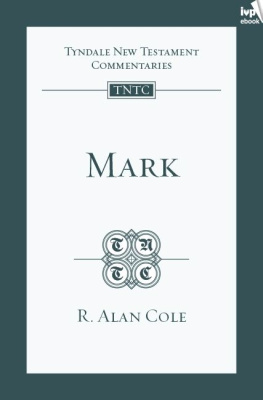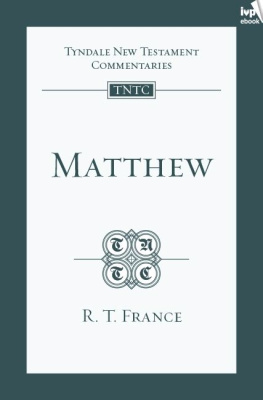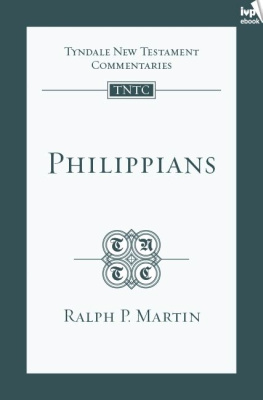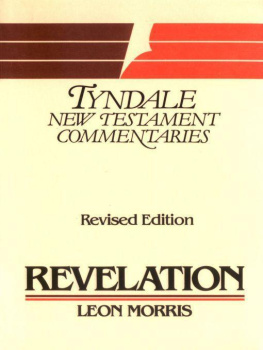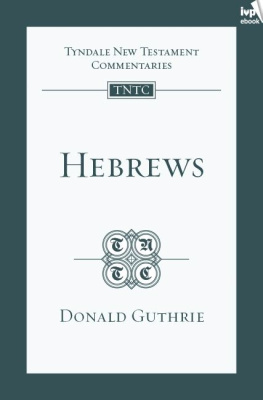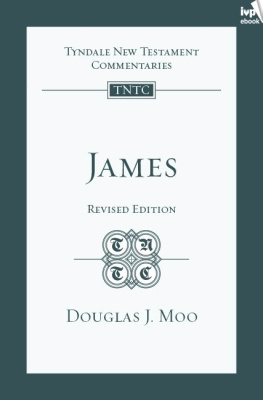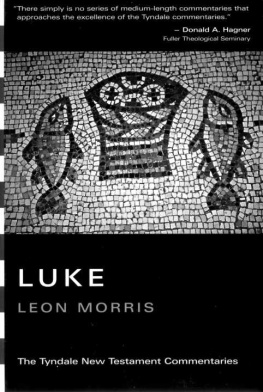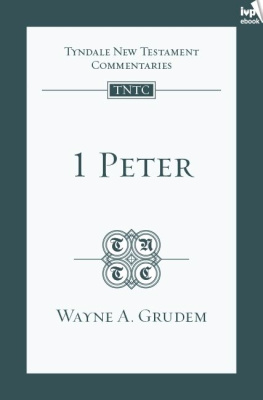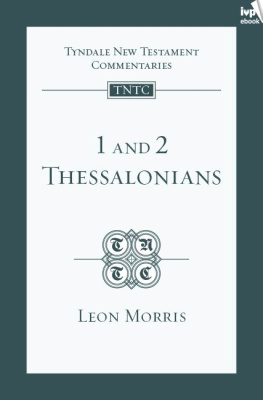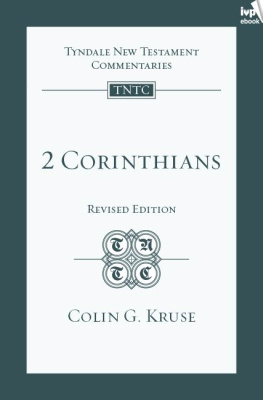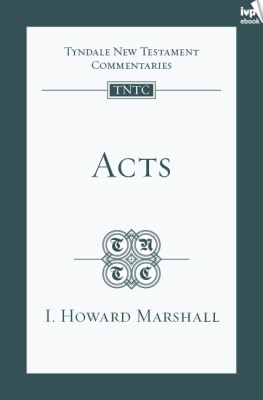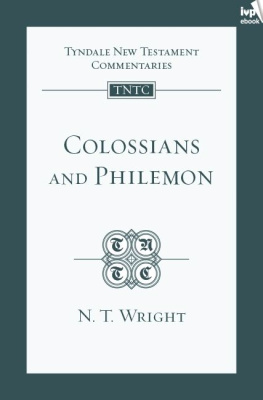F. F. Bruce - Romans (TNTC)
Here you can read online F. F. Bruce - Romans (TNTC) full text of the book (entire story) in english for free. Download pdf and epub, get meaning, cover and reviews about this ebook. year: 2008, publisher: IVP, genre: Religion. Description of the work, (preface) as well as reviews are available. Best literature library LitArk.com created for fans of good reading and offers a wide selection of genres:
Romance novel
Science fiction
Adventure
Detective
Science
History
Home and family
Prose
Art
Politics
Computer
Non-fiction
Religion
Business
Children
Humor
Choose a favorite category and find really read worthwhile books. Enjoy immersion in the world of imagination, feel the emotions of the characters or learn something new for yourself, make an fascinating discovery.
Romans (TNTC): summary, description and annotation
We offer to read an annotation, description, summary or preface (depends on what the author of the book "Romans (TNTC)" wrote himself). If you haven't found the necessary information about the book — write in the comments, we will try to find it.
Romans (TNTC) — read online for free the complete book (whole text) full work
Below is the text of the book, divided by pages. System saving the place of the last page read, allows you to conveniently read the book "Romans (TNTC)" online for free, without having to search again every time where you left off. Put a bookmark, and you can go to the page where you finished reading at any time.
Font size:
Interval:
Bookmark:
Volume 6
General Editor: Leon Morris
An Introduction and Commentary
F.F. Bruce
F. F. Bruce 1985
All rights reserved. This eBook is licenced to the individual who purchased it and may not be reproduced, stored or transmitted, in any form, or by any means, electronic, mechanical, or otherwise, except for the sole, and exclusive use of the licensee, without prior permission of the publisher or the Copyright Licensing Agency.
Unless otherwise stated, quotations from the Bible are from the Revised Standard Version, copyrighted 1952 1971, 1973 by the Division of Christian Education, National Council of the Churches of Christ in the USA, and used by permission.
First published 1963
Second edition 1985
Reprinted in this format 2008
ISBN: 9781783593194
Series design: Sally Ormesher
Illustration: Kev Jones

INTER-VARSITY PRESS
Norton Street, Nottingham NG7 3HR, England
Email:
Website: www.ivpbooks.com
Inter-Varsity Press publishes Christian books that are true to the Bible and that communicate the gospel, develop discipleship and strengthen the church for its mission in the world.
Inter-Varsity Press is closely linked with the Universities and Colleges Christian Fellowship, a student movement connecting Christian Unions in universities and colleges throughout Great Britain, and a member movement of the International Fellowship of Evangelical Students. Website: www.uccf.org.uk
To Ella in memory of Athol
A. The Gospel According To Paul (1:1611:36)
B. The Christian way of life (12:115:13)
The sustained argument of this letter makes it impossible to bring out its meaning adequately on a verse-by-verse basis. The procedure adopted, accordingly, is to present an exposition of the successive divisions of the argument, each section of the exposition being followed by more detailed verse-by-verse comments on the division just expounded. The student who wishes to consult this work for help on a particular verse should therefore read the exposition of the passage within which that verse falls as well as any comment that may be provided expressly on the verse itself.
The original Tyndale Commentaries aimed at providing help for the general reader of the Bible. They concentrated on the meaning of the text without going into scholarly technicalities. They sought to avoid the extremes of being unduly technical or unhelpfully brief. Most who have used the books agree that there has been a fair measure of success in reaching that aim.
Times, however, change. A series that has served so well for so long is perhaps not quite as relevant as when it was first launched. New knowledge has come to light. The discussion of critical questions has moved on. Bible-reading habits have changed. When the original series was commenced it could be presumed that most readers used the Authorized Version and one could make ones comments accordingly, but this situation no longer obtains.
The decision to revise and update the whole series was not reached lightly, but in the end it was thought that this is what is required in the present situation. There are new needs, and they will be better served by new books or by a thorough updating of the old books. The aims of the original series remain. The new commentaries are neither minuscule nor unduly long. They are exegetical rather than homiletic. They do not discuss all the critical questions, but none is written without an awareness of the problems that engage the attention of New Testament scholars. Where it is felt that formal consideration should be given to such questions, they are discussed in the Introduction and sometimes in Additional notes.
But the main thrust of these commentaries is not critical. These books are written to help the non-technical reader to understand his Bible better. They do not presume a knowledge of Greek, and all Greek words discussed are transliterated; but the authors have the Greek text before them and their comments are made on the basis of the originals. The authors are free to choose their own modern translation, but are asked to bear in mind the variety of translations in current use.
The new series of Tyndale Commentaries goes forth, as the former series did, in the hope that God will graciously use these books to help the general reader to understand as fully and clearly as possible the meaning of the New Testament.
Leon Morris
It is fitting, at the outset of this Tyndale Commentary on Romans, to remind ourselves of William Tyndales own estimate of the letter as the principal and most excellent part of the New Testament and a light and a way in unto the whole scripture He goes on:
No man verily can read it too oft or study it too well; for the more it is studied the easier it is, the more it is chewed the pleasanter it is, and the more groundly it is searched the preciouser things are found in it, so great treasure of spiritual things lieth hid therein.
Readers or interpreters of Paul, especially when they find themselves strongly attracted by his personality and reasoning power, are frequently tempted to tone down those features in his writings which are felt to be uncongenial, not to say scandalous, to modern tastes. It is possible to go along with Paul so far, and then try to go farther, not by accepting more of his teaching, but by unconsciously modifying his concepts so as to bring them into closer conformity with current thought. But a man of Pauls calibre must be allowed to be himself and to speak his own language. Well-meant attempts to make him prophesy a little more smoothly than in fact he does can but diminish his stature, not enhance it. We of the twentieth century shall grasp his abiding message all the more intelligently as we permit him to deliver it in his own uncompromising first-century terms.
I have used the opportunity provided by this revised edition not only to replace the AV by the RSV as the basis of the commentary, but also to incorporate the results of twenty years further thought and study. I am greatly indebted to the excellent commentaries which have appeared since my first edition was published in 1963; among these the works of Ernst Ksemann and C. E. B. Cranfield call for specially honourable mention.
F. F. Bruce
| ad loc. | At the place (under discussion). |
| AV | Authorized (King James) Version, 1611. |
| BAGD | W. Bauer, Greek-English Lexicon of the New Testament , translated by W. F. Arndt and F. W. Gingrich, second edn. rev. and augmented by F. W. Gingrich and F. W. Danker (Chicago, 1979). |
| BJRL | Bulletin of the John Rylands (University) Library, Manchester. |
| EQ | Evangelical Quarterly. |
| E.T. | English Translation. |
| ExT | Expository Times. |
| GNB | Good News Bible (Todays English Version), 1976. |
| JBL | Journal of Biblical Literature. |
| JTS | Journal of Theological Studies. |
| LXX | Septuagint (pre-Christian Greek version of the Old Testament). |
| mg. | Margin. |
| MT | Massoretic Text (of the Hebrew Bible). |
| NEB | New English Bible, 1970. |
| NIDNTT | New International Dictionary of New Testament Theology , edited by Colin Brown (Exeter, 197578). |
| NIV | The Holy Bible, New International Version, 1978. |
Font size:
Interval:
Bookmark:
Similar books «Romans (TNTC)»
Look at similar books to Romans (TNTC). We have selected literature similar in name and meaning in the hope of providing readers with more options to find new, interesting, not yet read works.
Discussion, reviews of the book Romans (TNTC) and just readers' own opinions. Leave your comments, write what you think about the work, its meaning or the main characters. Specify what exactly you liked and what you didn't like, and why you think so.

